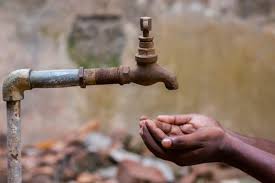Over 536,000 out of the 8.3 million households in Ghana fetch water from surface water sources for both drinking and domestic purposes.
But, data gathered by the Ghana Statistical Service indicate the worst situations are recorded in the North East Gonja District of the Savannah Region.
Nearly 97.8% of households in the district either depend on dug outs or ponds as a source of drinking water and for domestic purposes.
Tolon in the Northern Region and Sene East located in the Bono East Region followed second and third respectively.
There however seems to be an appreciable decline in the number of households in the country that consume unimproved water sources.
In the last population and housing census, 10.6% of the 5.4 million households in Ghana relied on surface water.
However, the last decade has seen 6.4% of the 8.3 million households consuming water from dug outs.
During a meeting with stakeholders in the Water, Sanitation, and Hygiene (WASH) sector, Director of Field Operations at the Ghana Statistical Service, Peter Takyi entreated stakeholders to point out areas with inadequate water access.
“These studies are not solely for the purposes of their doing sake. They must facilitate policy formation. These areas must be checked to ensure potable water is provided for them,” he said.
The statistical study also revealed 48.4% of households in Saboba in the Northern Region traveled for more than 30 minutes to access a water source.
An estimated 511,622 households nationwide use more than half an hour to access any water source outside their homes, with the Savannah region clocking the longest duration of 33 minutes.
The study assessed how long members of a household took to go to a water source, fetch the water, and return home.
An average of 22 minutes was the time spent for rural dwellers to access water as opposed to 13 minutes in the urban areas.
Stakeholders are hoping to establish a joint working group of the Ghana Statistical Service and Sanitation sector and a WASH database.
Latest Stories
-
Diddy’s reputation is tarnished, but could he find a way back?
48 minutes -
US to face holders Mexico in Gold Cup finals
59 minutes -
Spain begin Euro 2025 campaign by thrashing Portugal
1 hour -
Dortmund confirm Chelsea deal agreed for Gittens
1 hour -
Sinner continues seamless start to Wimbledon bid
2 hours -
‘One of toughest losses’ – Draper exits Wimbledon early again
2 hours -
Djokovic outclasses Evans to continue Wimbledon bid
2 hours -
Commercial use of tricycles still illegal – Judge reminds operators
2 hours -
Security guard jailed for stealing €5,600 from NHIS Head Office
2 hours -
Ho Teaching Hospital charts path to medical excellence and tourism under new leadership
4 hours -
Kenya looks to privatise state assets to draw private-sector investments, says President Ruto
4 hours -
Trump to host 5 African leaders next week to discuss ‘commercial opportunities’
4 hours -
South Africa’s former deputy president Mabuza dies
5 hours -
Big shake-up in Nigerian politics as heavyweights join forces
5 hours -
Congo, M23 rebels plan return to Qatar talks amid Trump pressure
5 hours

